
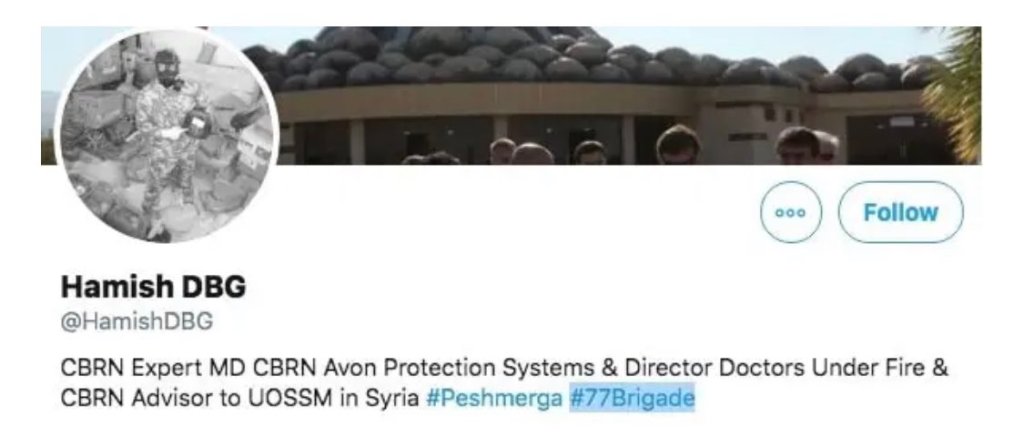
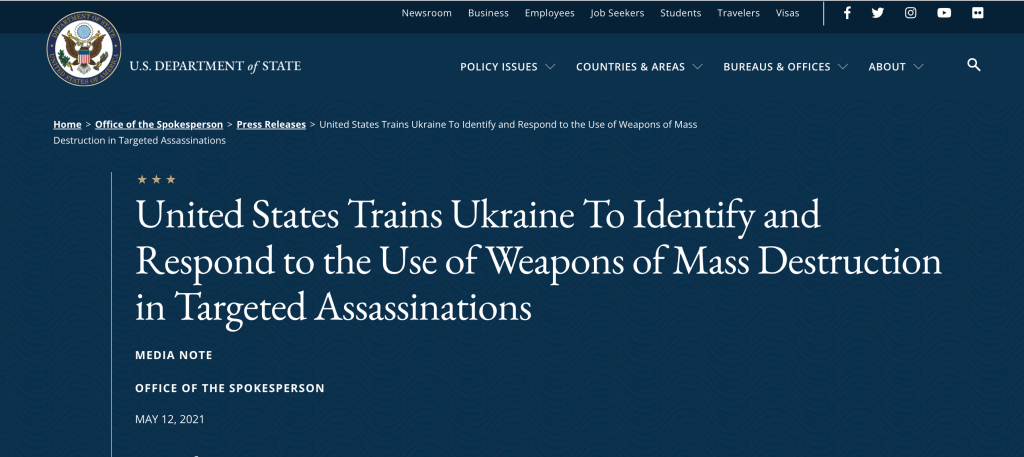
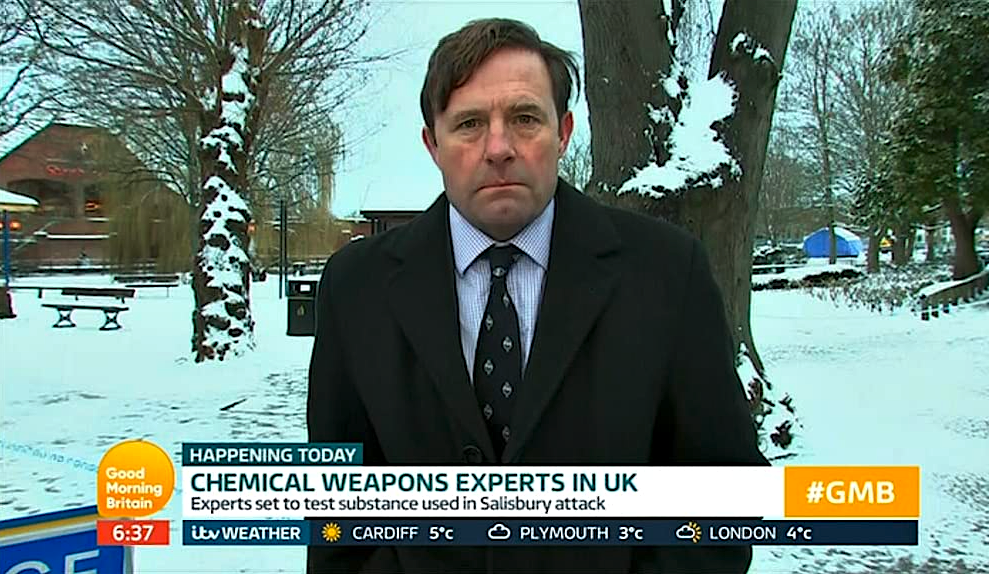
Britanski obveščevalec v senci, Hamish de Bretton-Gordon, je bil v ospredju prevar s kemičnim orožjem v Siriji.
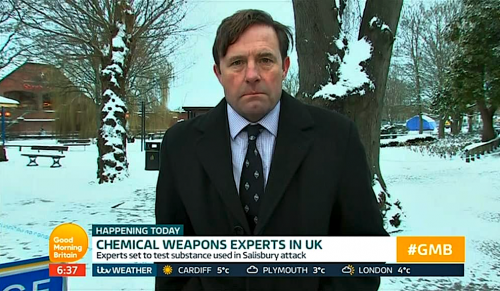 Hamish e Bretton-Gordon.(ITVnews GMB screenshot.)
Hamish e Bretton-Gordon.(ITVnews GMB screenshot.)
Zdaj, v Ukrajini, je spet na svojih starih trikih, piše Kit Klarenberg -The Gray Zone.

Ker so Washington in njegovi zavezniki v Natu prisiljeni od strani opazovati, kako ruski vojaški atroj napreduje po vzhodni Ukrajini in obkroža Kijev, so se ameriški in britanski uradniki zatekli k zaskrbljujoči taktiki, ki bi lahko sprožila množično stopnjevanje. Po podobnih trditvah njegovega državnega sekretarja in veleposlanika pri Združenih narodih je ameriški predsednik Joseph Biden izjavil, da bo Rusija plačala "hudo ceno", če bo uporabila kemično orožje v Ukrajini.
Opozorila, ki izhajajo iz Bidenove administracije, vsebujejo grozljive odmeve tistih, ki jih je izdala administracija predsednika Baracka Obame v času umazane vojne proti Siriji, ki jo vodijo ZDA.
Skoraj takoj, ko je Obama uvedel svojo nesrečno politiko "rdeče črte" in obljubil ameriški vojaški odgovor, če bi sirska vojska napadla opozicijo, ki jo podpira Zahod, s kemičnim orožjem, so opozicijske frakcije, ki so povezane z Al Kaido, objavile trditve o množičnih žrtvah sarina in klora. bombardiranja civilistov. Rezultat je bil niz raketnih napadov ZDA in Združenega kraljestva na Damask in dolgotrajna kriza, ki je skoraj sprožila vrsto katastrofalne vojne za spremembo režima, ki je destabilizirala Irak in Libijo.
V vsakem večjem dogodku s kemičnim orožjem so bili prisotni znaki inscenacije in prevare oborožene sirske opozicije. Kot je novinarju Charlesu Glassu povedal nekdanji veleposlanik ZDA na Bližnjem vzhodu, je bila »rdeča črta« odprto povabilo k operaciji z lažno zastavo.
Elementi prevare so bili še posebej očitni v incidentu 7. aprila 2018 v mestu Douma, ko je protivladna milica na robu poraza trdila, da so bili civilisti masakrirani v napadu s klorom s strani sirske vojske.
Veteranski inšpektorji Organizacije za prepoved kemičnega orožja (OPCW) niso našli dokazov, da bi sirska vojska izvedla kakršen koli takšen napad, vendar pa kaže, da je bil celoten incident insceniran, da bi sprožil posredovanje Zahoda. Njihovo poročilo je nato vodstvo organizacije cenzuriralo, inšpektorji pa so bili podvrženi kampanji blatenja in ustrahovanja.
Med sirskim konfliktom je bil samooklicani "kemični bojevnik" po imenu Hamish de Bretton-Gordon tesno vpleten v številne prevare s kemičnim orožjem, ki so podprle vojno in povečale pritisk za zahodno vojaško intervencijo.
Letos 24. februarja, le nekaj trenutkov po vstopu ruske vojske v Ukrajino, se je de Bretton-Gordon znova pojavil v britanskih medijih in trdil, da Rusija pripravlja kemični napad na ukrajinske civiliste. Od takrat je zahteval, da se Ukrajincem zagotovi vodnik, ki ga je napisal z naslovom »Kako preživeti kemični napad«.
Kdo je torej de Bretton-Gordon in ali njegov nenadni ponovni nastop v vlogi strokovnjaka za vojno med Rusijo in Ukrajino pomeni vrnitev k nevarni politiki rdeče črte ZDA in Združenega kraljestva?
Hours After Invasion, “Chemical Warrior” Demands Western Escalation
Following months of fevered speculation about an impending Russian invasion of Ukraine, when it finally came to pass on the early morning of Feb. 24, most were caught entirely by surprise. Media outlets and pundits scrambled to get their stories straight, while Western leaders rushed to construct a cohesive ‘response’.
By contrast, Hamish de Bretton-Gordon, a British army veteran identified by U.K. media as a “former spy,” was in no such muddle. Within just three hours, he had a fiery op-ed prepared for The Guardian, demanding the U.S. and Europe “show their steel in the face of Putin’s aggression.” Warning that Vladimir Putin was “much more willing to face off with NATO” than before, de Bretton-Gordon charged that the West “stood back and watched in Syria,” and “it must not do the same in Ukraine.”
“Syria shows what happens when you turn a blind eye and are too heavily influenced by peaceniks,” de Bretton-Gordon fulminated. “Those of us involved in interventions in Iraq and Afghanistan over the past 30 years…we look at Syria and know we should have done better. That knowledge should inform our response to Putin’s aggression now.”
In reality, Washington and its allies did not stand back and watch in Syria; it waged a decade-long proxy war employing jihadist paramilitaries and airstrikes on Damascus, then occupied oil-producing portions of the country and subjected its citizens to crippling sanctions, which to this day deprive them of food, electricity and vital medical supplies.
Of all people, de Bretton-Gordon – whose Twitter profile once identified him as a member of 77th Brigade, the British Army’s official psychological warfare division – is uniquely placed to know of these horrors. After all, he played a pivotal role in promoting and extending the dirty war through the management of information surrounding chemical weapons incidents.
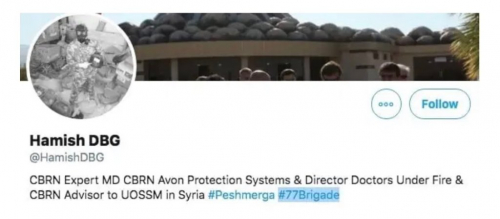
Manipulation, Absurdities and Fraud
As The Grayzone has revealed, the involvement of de Bretton-Gordon in the Syrian conflict dates back to at least 2013, when by his own admission he was engaged in a covert effort to smuggle soil samples out of the opposition-occupied areas. This work would have inevitably placed him in extremely close quarters with jihadist elements raking in Western funding while benefiting from NATO training and weapons.
Contemporary media reports reveal the U.K.’s MI6 was engaged in a sample-gathering effort in the country at the very time time de Bretton-Gordon was inside Syria, strongly suggesting his linkage to the foreign intelligence agency. One article makes abundantly clear the purpose of the soil-sample exercise was to push the U.S. into intervening by proving government culpability for alleged chemical weapons attacks.
Other forms of evidence were also collected on-the-ground by de Bretton-Gordon, and provided to a number of official investigations into chemical attacks. In at least one instance – an OPCW/U.N. Joint Investigative Mechanism (JIM) probe into a purported chemical strike in Talmenes, April 2014 – videos submitted by CBRN Taskforce, a shady organization he founded in Aleppo, were found to show clear signs of falsification.
De Bretton-Gordon threw his chemical weapons expertise into further doubt when he told British media that any common refrigerator could be transformed into a chemical weapon, falsely claiming that R22 refrigerant cylinders contained material for improvised chlorine bombs. “Somebody could go to a waste site where people chuck away fridges [in the U.K.] and get a whole bunch of those things and blow them up,” the supposed arms specialist claimed.
De Bretton Gordon has gone as far as claiming to a British tabloid that Russia could deploy missiles and hand grenades containing the highly deadly Soviet-era chemical agent Novichok “in any future war with the West.”
Such absurd commentary and subterfuge has done nothing to dent de Bretton-Gordon’s credibility, however. His mainstream profile has only grown over time, with outlets invariably presenting him as a courageous human rights defender risking his life to train local doctors and rescue workers.
On more than one occasion, however, de Bretton-Gordon has directly involved Western journalists in MI6’s soil gathering efforts. For instance, during a 2014 podcast interview with Wilton Park, an NGO funded by the U.K. Foreign Office, de Bretton-Gordon boasted of his responsibility for a story in The Times of London alleging a Syrian chemical attack in the town of Sheikh al-Maqsood.
“In March last year there was a reported sarin attack in Sheikh al-Maqsood and I helped the Times – chap called Anthony Lloyd who very sadly got shot two weeks ago – to cover this story and tried to get samples to the U.K. for analysis … I won’t go into the details of that,” he recalled.
There to Blame Damascus
Then-Prime Minister David Cameron invoked the Sheikh al-Maqsood incident to increase pressure on Damascus, citing “the picture as described to me by the Joint Intelligence Committee” as the basis for his assertion of a chemical attack against the town by the Syrian army.
Throughout the dirty war on Syria, de Bretton-Gordon routinely cropped up in the media attributing gas attacks and war crimes to Syrian and Russian forces, and fear-mongered about their implications for future conflicts with the West.
The latter role is one de Bretton-Gordon has enthusiastically resumed throughout the war in Ukraine, aggressively hyping the threat to Western countries. His messaging has tracked seamlessly with that of the U.S. government, which initiated a program months before Russia’s military operation to prepare Ukraine’s security sector for an impending weapons of mass destruction attack.
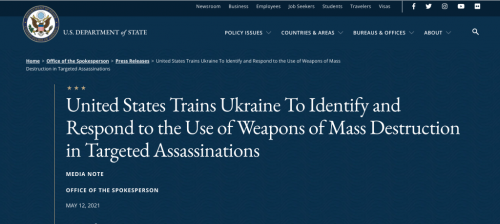
Months before war, U.S. trains Ukrainians in the threat of “targeted weapons of mass destruction attacks”
Back in May 2021, the State Department announced that Washington had conducted a “virtual training exercise” with “partners” in Kiev, including domestic security services, law enforcement, and first responders, to “identify, respond to, and investigate assassinations involving weapons of mass destruction,” due to “recent events in Europe” highlighting “the real threat of government-sanctioned, targeted weapons of mass destruction attacks.”
Along the way, Ukrainians were tutored in “[identifying] the medical symptoms that indicate WMD material use, the attack cycle involved in WMD assassination attempts, and the specific measures that enable safe and secure detection and response to WMD incidents.”
Quite why this instruction was given at this particular time is unclear, as was the “recent events in Europe” to which the press release referred. Perhaps the State Department was alluding to the alleged novichok poisoning of the Russian opposition figure Alexei Navalny in August 2020. On what grounds that failed assassination necessitated a grand, multi-agency training exercise in dealing with “targeted WMD attacks” is anyone’s guess.
Whatever the purpose of the U.S. training program was, Ukrainian security personnel can now claim they have the training to identify the precise “medical symptoms that indicate WMD material.”
This is significant, because ever since the conflict began, Kiev has exhibited an endless enthusiasm for lying, having distorted or even outright concocted events and facts whole-cloth to advance its objectives on countless occasions.
The most dangerous claims advanced by Ukrainian propagandists have been reinforced by the supposed authority of de Bretton-Gordon, who has argued that Russian chemical strikes were absolutely inevitable, based his prediction on his opinion that Moscow “has no morals or scruples.”
The self-styled chemical weapons expert has even cautioned that Putin could deploy nuclear weapons or create a pandemic “more deadly than Covid” with an Ebola weapon. He has further speculated that Russian forces may unleash a deadly virus seized from one of several Pentagon-funded biolabs in Ukraine, then blame it on the U.S.
 From a September 05 2020 Times of London profile of Hamish de Bretton-Gordon
From a September 05 2020 Times of London profile of Hamish de Bretton-Gordon
From Syria to Ukraine
In a typical media appearance, on March 10th, de Bretton Gordon told London’s LBC radio show that “nothing is off the table at this stage.” Among the horrors he forecast was the use of white phosphorous “to set towns and cities on fire.”
Justifying his certainty, de Bretton-Gordon forcefully asserted, “the only way to take a large city or town ultimately is to use chemical weapons.” He pointed to Syria to prove his point – but without referencing his own pivotal role in escalating that conflict through the manipulation of evidence and scientifically bereft fear-mongering in the media.
Now, de Bretton-Gordon has resurfaced at the center of the aggressive push for escalation with a nuclear armed Russia. If his role in Syria is any guide, a series of cynical deceptions could be on the way.
Kit Klarenberg is an investigative journalist exploring the role of intelligence services in shaping politics and perceptions.
This article is from The Grayzone.
Mar 26, 2022